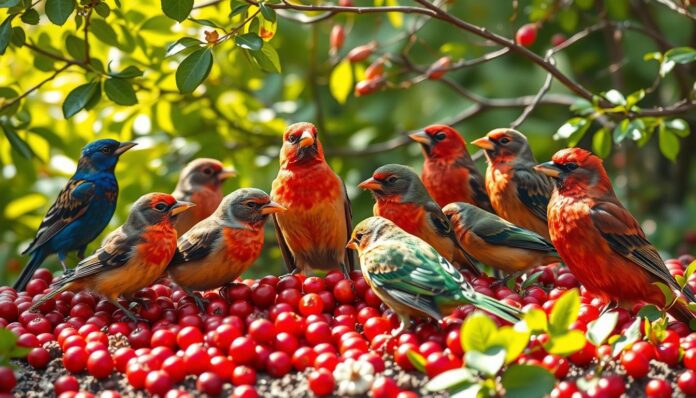Can Birds eat Cranberries? Did you know over 70% of birds in the wild eat cranberries? These small, tart berries are a tasty treat for birds. They also offer many health benefits. It’s important for bird lovers to know how to safely feed cranberries to their feathered friends.
Cranberries are packed with Vitamin C and are good for Vitamin K and manganese. Bird expert Dick Schroeder says not all birds like the tart taste of fresh cranberries. But, there are safe ways to add these berries to your bird’s diet.
Understanding Cranberries: Nature’s Tart Superfood
Cranberries are a special fruit with a long history and great health benefits. They are found in the Northern Hemisphere and are close to blueberries. The name “cranberry” comes from early settlers who saw the flower like a crane’s neck.
Origin and Composition
Cranberries grow in North America’s bogs and Eastern Europe. They love acidic soil and semi-bog conditions. These shrubs need full sun but can handle some shade. They have shallow roots, making them easy to grow in pots.
Seasonal Availability
Fresh cranberries are picked from September to December. Their bright red color and tart taste make them great in many dishes. They’re also a hit in antioxidant-rich snacks for avian pets.
Nutritional Profile
Cranberries are packed with nutrients. They’re full of vitamin C, vitamin K, and manganese. They also have lots of antioxidants. These cranberry health benefits for birds and people are well-known.
| Nutrient | Amount per 100g |
|---|---|
| Vitamin C | 13.3mg |
| Vitamin K | 5.4μg |
| Manganese | 0.4mg |
| Antioxidants | 9584μmol TE |
Can Birds eat Cranberries?
While Ocean Spray couldn’t confirm if birds eat cranberries, many fruit-eating birds do enjoy them. A local cranberry bog owner, known as “Bog Man,” says geese and ducks might eat the plants. But he hasn’t seen birds eating the berries themselves.
Cranberries can be good for birds, giving them important nutrients and antioxidants. Fresh cranberries are full of vitamins C and E, and fiber. They make a healthy snack for birds. But, not all cranberry products are safe for birds. This includes those with sugar, chocolate, or artificial flavors and colors.
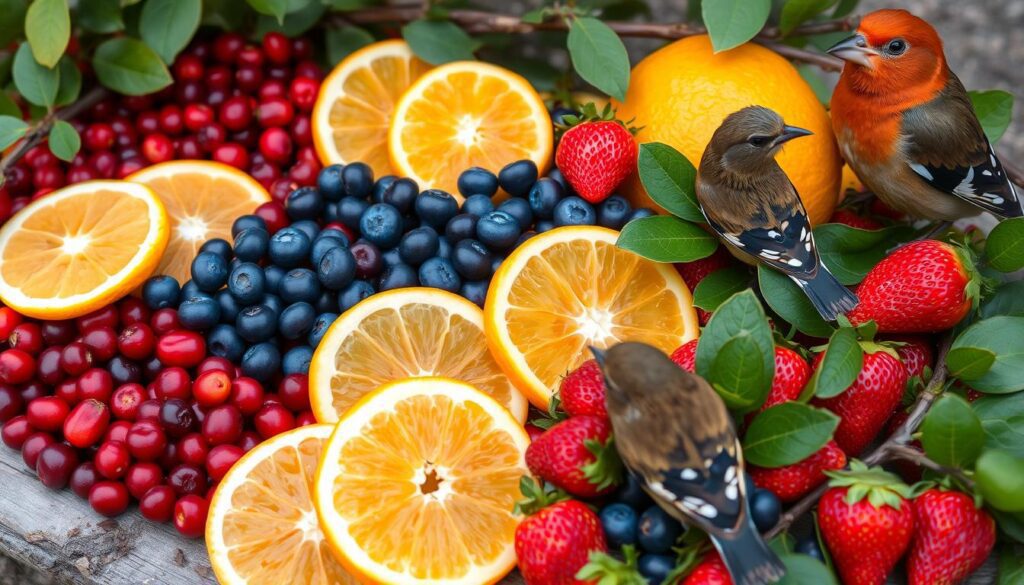
can birds eat cranberries? To attract birds to your yard, plant bird-friendly trees and shrubs. Try American holly, winterberry, inkberry, and Virginia creeper. You can also offer birdseed, which is great during the holidays.
Many backyard birds like cranberries, like American Robins and Northern Mockingbirds. Cedar Waxwings, Eastern Bluebirds, Scarlet Tanagers, Hermit Thrushes, and Waxwings also enjoy them. By giving them bird-friendly fruits and making sure they get the right avian nutrition, you can help them thrive.
You May Like: Blue Crowned Pigeon: A Majestic Bird of Paradise
Health Benefits of Cranberries for Birds
Cranberries are not just tasty for humans, but also great for birds. They are full of antioxidants that can boost a bird’s health. Adding them to a bird’s diet can give them essential nutrients.
Antioxidant Properties
Cranberries are known for their antioxidants. These help protect birds from harmful free radicals. They can also help prevent heart disease in some bird species, like African greys.
Immune System Support
Cranberries are rich in vitamin C, which is key for a strong immune system. This vitamin helps birds fight off infections. They also contain vitamin E, which boosts their natural defenses.
Vitamin and Mineral Content
Cranberries have many vitamins and minerals that are good for birds. They have vitamin K for blood clotting and bone health. They also have manganese for blood sugar and brain function. The fiber in cranberries helps with digestion.
Feeding your birds cranberries can give them a natural snack. It supports their health and keeps them full of energy.
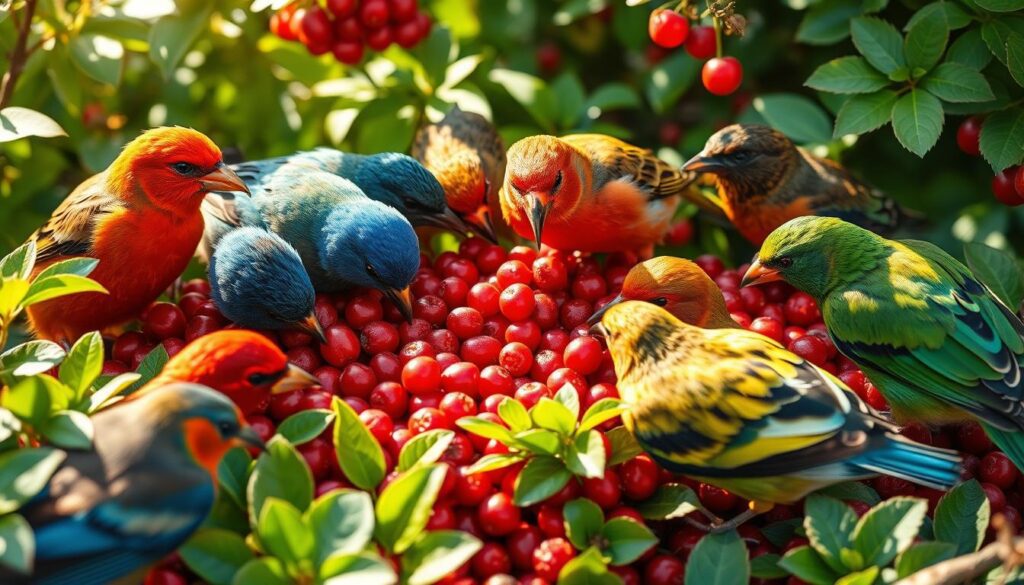
Types of Birds That Enjoy Cranberries
Many bird species love cranberries. Woodpeckers, jays, robins, and waxwings are just a few. Even softbills in captivity might enjoy them. But, each bird has its own taste preferences.
Cranberries are packed with vitamins C and E, antioxidants, and fiber. They’re a healthy snack for many birds. The red berries have more nutrients, making them a better choice.
Cranberries can stay fresh in the fridge for months. Frozen ones can last years if kept cold enough. Dried cranberries are also good, but they might stick to toys.
| Bird Species | Cranberry Preference |
|---|---|
| Woodpeckers | Enjoy cranberries as a nutritious snack |
| Jays | Relish the tart flavor of cranberries |
| Robins | Readily consume cranberries in the wild |
| Waxwings | Frequently spotted feeding on cranberries |
| Warblers | Appreciate the antioxidant-rich cranberries |
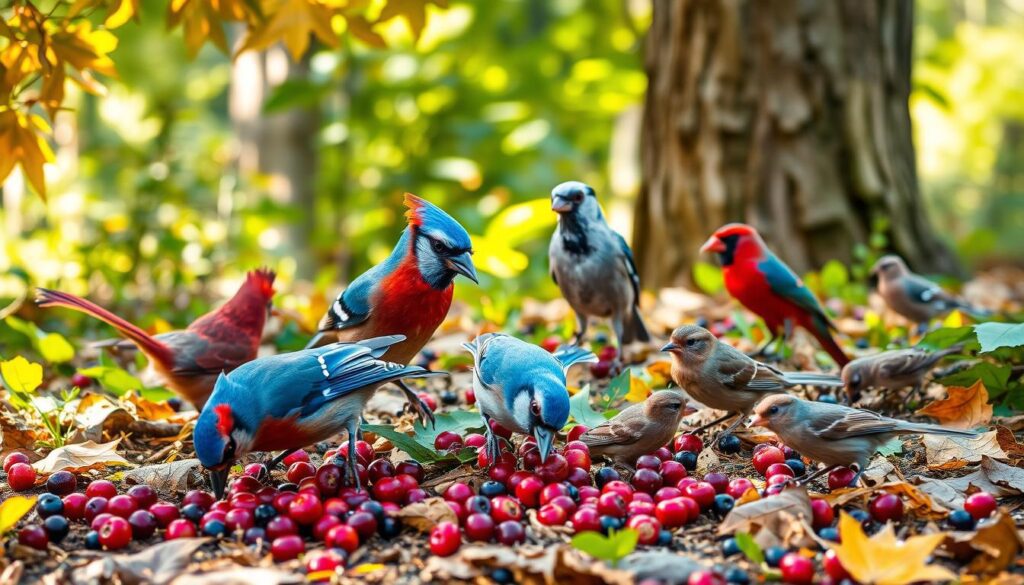
Fresh vs. Dried Cranberries for Birds
Choosing between fresh and dried cranberries for seasonal fruits for pet birds is important. Fresh cranberries are a great natural diet supplement for birds but are only available for a few months. Dried cranberries, on the other hand, can be fed all year because they last longer.
Pros and Cons of Fresh Cranberries
Fresh cranberries are full of nutrients like vitamins, minerals, and antioxidants. These are good for birds. But, they spoil quickly and must be eaten soon after buying.
Guidelines for Dried Options
- Choose sulfite-free dried cranberries to keep birds safe.
- Dried cranberries may lose some nutrients when dried.
- Always check the expiration date and store them well to keep them fresh.
Experts say fresh cranberries are better for nutrition. But, both fresh and dried cranberries are good seasonal fruits for pet birds and natural diet supplements for birds in a balanced diet.
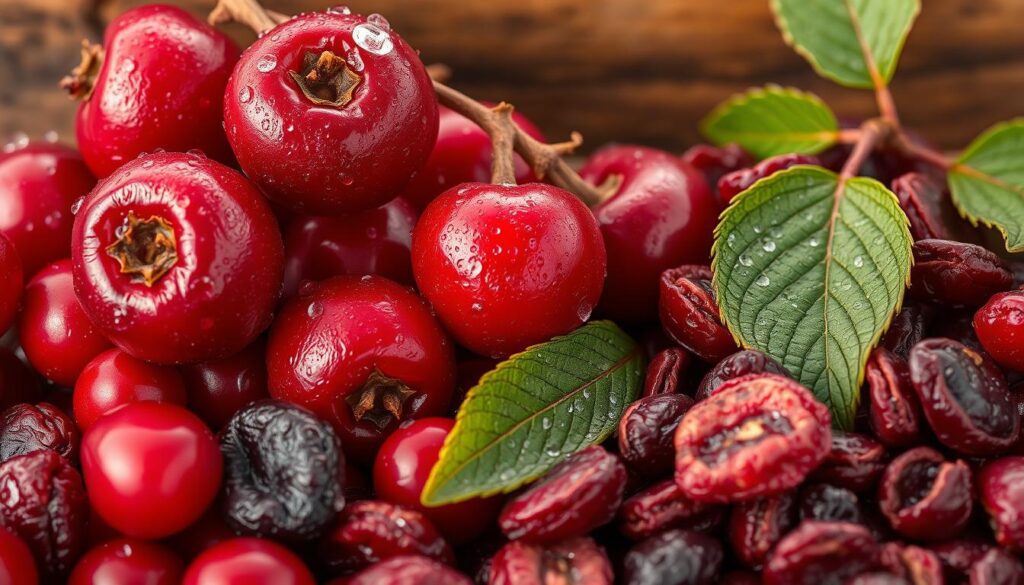
Safe Feeding Methods and Portions
When giving wild bird feeding tips and safe feeding methods for birds, think about how to offer cranberries right. You can put them on platform feeders or in shallow dishes. This lets birds get to them easily. Or, you can mix chopped cranberries into your birdseed.
Get creative with cranberry garlands by mixing them with nuts, seeds, and dried fruits. This makes your feeding station look good and helps birds forage naturally. You can also add dried cranberries to suet cakes for a nutritious treat.
It’s key to keep cranberries to 10-20% of a bird’s diet. Mix them with other fruits, nuts, and seeds for a balanced meal. For parrots, give 1-2 dried cranberries a day.
By using these safe feeding methods for birds, you can add cranberries to your birds’ diets safely and happily.
Potential Risks and Precautions
Cranberries are usually safe for birds, but we must watch out for risks. Giving too many cranberries can cause diarrhea in some birds. So, it’s key to give them in small amounts as part of a balanced diet. Also, avoid giving birds cranberry juice or sauce because they have a lot of sugar, which is bad for their health.
It’s normal to see red droppings from birds eating cranberries. This is because the berries’ color is passing through their system. It’s not harmful.
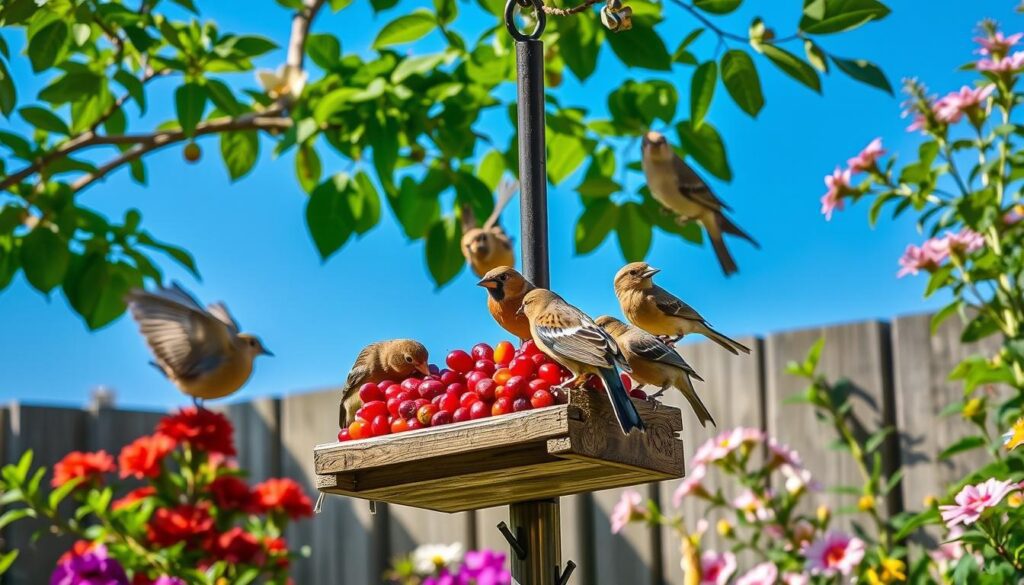
Storage and Freshness Tips
When giving dried cranberries to birds, store them right to stop mold growth. Mold is toxic to birds. Keep them in an airtight container in a cool, dry spot. For fresh cranberries, take away any leftovers quickly to prevent spoilage.
If you see any bad signs like changes in behavior or droppings, talk to a vet. Knowing the risks and following good practices helps keep your birds safe and healthy.
| Potential Risks | Precautions |
|---|---|
| Overfeeding can lead to diarrhea | Provide cranberries in moderation as part of a balanced diet |
| Cranberry juice and sauce have high sugar content | Avoid feeding birds cranberry juice or sauce |
| Reddish-colored bird droppings (normal and harmless) | Understand this is a common and harmless side effect |
| Potential for mold growth in dried cranberries | Store dried cranberries in an airtight container in a cool, dry place |
| Spoilage of fresh cranberries | Remove any uneaten fresh cranberries promptly |
| Adverse reactions (changes in behavior, appetite, or droppings) | Consult a veterinarian if any concerning signs are observed |
Cranberry Alternatives and Complementary Foods
Cranberries are a tasty and healthy snack for birds. But, it’s good to mix things up in their diet. Try adding bird-friendly fruits like blueberries, strawberries, and raspberries. They offer different nutrients and make mealtime fun.
- Blueberries
- Strawberries
- Raspberries
To make a balanced natural diet supplements for birds, add cranberries to nuts, seeds, and veggies. This balances out the tartness of cranberries. Try different mixes to see what your birds like best.
| Food Item | Calories per Serving |
|---|---|
| Cranberry coconut cookies | 455 |
| Cranberries chicken breast dish | 236 |
| Cranberry orange sauce | 61 |
| Spiced cranberry crisp cake | 276 |
| Cranberry-orange cake with lemon glaze | 413 |
| Fruit salad with cranberries | 105 |
| Cranberry orange relish | 68 |
| Pumpkin cranberry muffins | 159 |
| Cranberry walnut layer cake | 441 |
| Cranberry orange walnut bread | 177 |
By giving your birds a variety of bird-friendly fruits and other foods, you can make a healthy diet. Make sure to watch how much they eat and what they like. This keeps them happy and healthy.
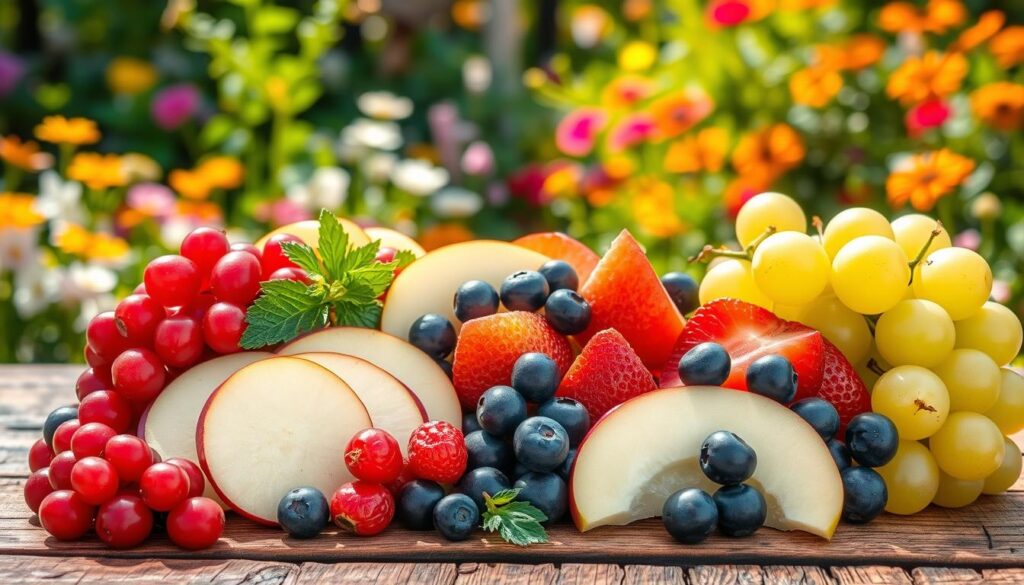
Common Myths About Feeding Cranberries to Birds
Many people think birds don’t like cranberries because they’re too tart. But, this is just a myth. Birds have fewer taste buds than humans, so they can eat cranberries without any issues. These berries are actually great for birds.
Some folks believe cranberry juice is good for birds. But, this is not true. Cranberry juice often has a lot of sugar, which is bad for birds. It’s better to give them cranberries in their natural form.
- Myth: Birds avoid tart fruits like cranberries.
- Myth: Cranberry juice is a safe and healthy option for birds.
Knowing these myths helps us give our birds the best food. We can make sure they get the good stuff they need to stay healthy.
Conclusion
Cranberries can be a healthy treat for many birds if given in small amounts. They are full of antioxidants, vitamins, and minerals that help birds stay healthy. Birds like finches and robins might enjoy them, but they should not be their main food.
Consider growing cranberry plants in your yard to give birds a natural food source. Dried cranberries are also a good option, but be careful of choking hazards or mold. Adding cranberries to your bird-friendly practices can help your local bird population thrive.
Always watch how your birds react to new foods and adjust the amount given. Knowing the good and bad of giving cranberries to birds helps you make better choices. This way, you can help your birds stay healthy and happy for a long time.
FAQ
Can birds eat cranberries?
Yes, birds can eat cranberries. Many fruit-eating birds enjoy both fresh and dried cranberries. They make a healthy addition to their diet.
What are the health benefits of cranberries for birds?
Cranberries are full of antioxidants, vitamin C, vitamin K, and fiber. These nutrients help support a strong immune system. They also promote overall well-being in birds.
Which types of birds enjoy eating cranberries?
Many bird species love cranberries. This includes woodpeckers, jays, robins, and waxwings. Warblers, bluebirds, mockingbirds, and catbirds also enjoy them. Thrushes, chickadees, titmice, nuthatches, grosbeaks, finches, and cardinals can safely eat them too.
What is the difference between fresh and dried cranberries for birds?
Fresh cranberries keep more nutrients but don’t last long. Dried cranberries last longer but might lose some vitamins. Experts say to give fresh cranberries when you can for the best nutrition.
How should cranberries be fed to birds?
You can offer cranberries on platform feeders, in dishes, or mixed into birdseed blends. Chop fresh cranberries for easier eating. Add dried cranberries to homemade suet cakes.
Are there any risks or precautions when feeding cranberries to birds?
Too many cranberries can cause diarrhea. Avoid giving cranberry juice or sauce because of the sugar. Store fresh cranberries well and clean up uneaten ones to prevent mold.
What are some good alternatives or complementary foods to offer with cranberries?
You can give birds other fruits like blueberries, strawberries, and raspberries with cranberries. Mixing cranberries with nuts, seeds, and veggies also makes a balanced diet.


